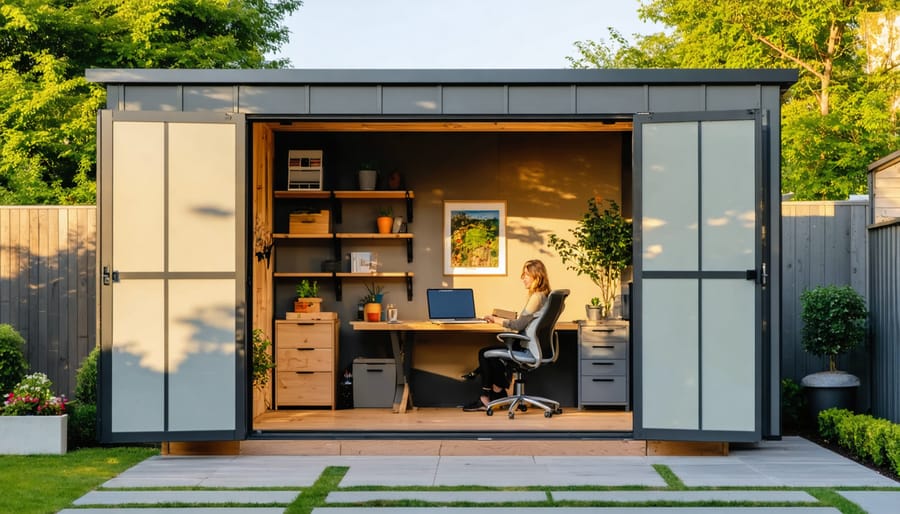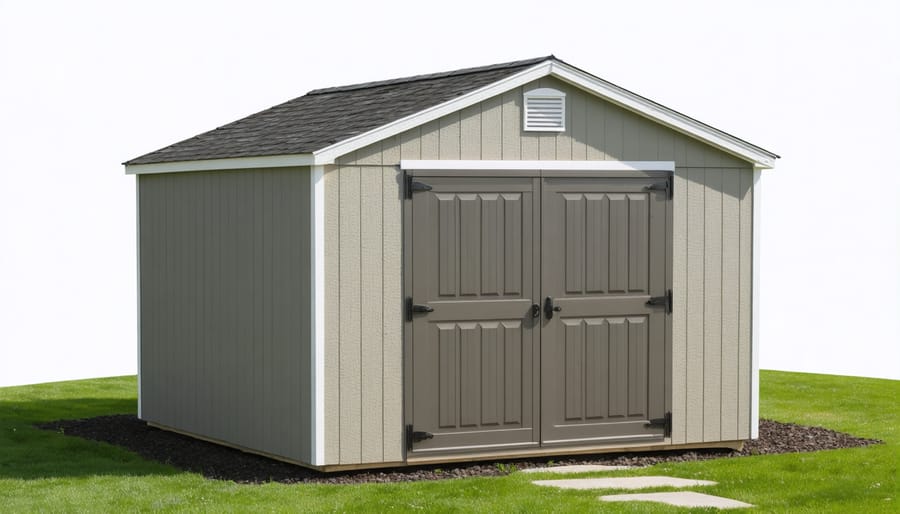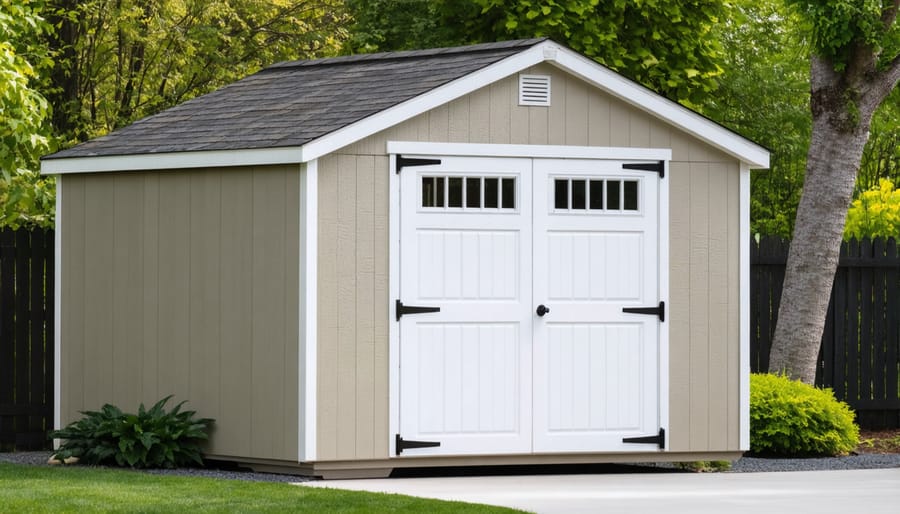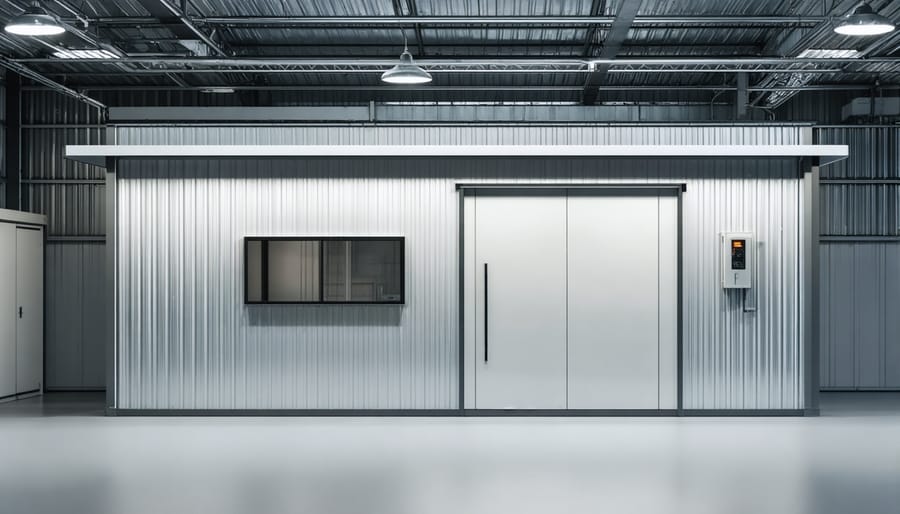Why a 9×12 Shed Could Be Your Best Business Investment This Year

A 9×12 shed delivers 108 square feet of dedicated workspace—enough room for a desk, storage shelving, and client meeting area without the burden of a commercial lease. Entrepreneurs across the country are transforming these compact structures into profitable home-based businesses, from photography studios to craft workshops, typically for under $5,000 in total setup costs.\n\n**This size works because it strikes the perfect balance.** You’ll have legitimate business space that separates work from home life, yet it fits in most backyards without requiring special permits in many municipalities. The footprint accommodates essential equipment while keeping utility costs minimal—many owners operate successfully with just electric heating and Wi-Fi extension.\n\n**Real success stories prove the concept.** Sarah, a graphic designer in Oregon, converted her 9×12 shed into a client consultation space that helped her double her rates by projecting professionalism. Mike runs a small engine repair business from his, serving 15-20 customers weekly. These aren’t hypothetical scenarios—they’re practical blueprints you can follow.\n\nThe key question isn’t whether a 9×12 shed *can* work for your business, but whether you’ve planned the setup correctly. From electrical requirements and insulation choices to zoning considerations and interior layout optimization, the details determine your success. Understanding upfront costs, ongoing expenses, and potential return on investment helps you make a confident decision that supports your entrepreneurial goals without breaking your budget.\n\n\n
The Sweet Spot: Why 9×12 Sheds Work Perfectly for Small Business
\n\nWhen you’re launching a small business from home, the 9×12 shed hits that perfect balance between affordability and functionality. At 108 square feet, you’re working with roughly the size of a small bedroom—compact enough to fit in most backyards, yet spacious enough to create a legitimate workspace that doesn’t feel cramped.\n\nLet’s talk numbers. Commercial office space typically runs between $15-30 per square foot annually, depending on your location. That means renting just 100 square feet could cost you $1,500-3,000 every year, with no equity built and landlord restrictions to navigate. A 9×12 shed, by contrast, is a one-time investment that becomes your asset. You’re looking at roughly $3,000-8,000 for a quality structure that pays for itself within a few years compared to rental costs.\n\nBeyond the financial benefits, there’s a practical advantage that many entrepreneurs discover too late: zoning flexibility. In numerous municipalities, structures under 120 square feet don’t require building permits or special approvals. The 9×12 configuration keeps you comfortably under this threshold in most areas, saving you time, paperwork, and permit fees. That said, always check your local regulations before purchasing—zoning laws vary significantly by location.\n\nThe dimensions themselves offer surprising versatility. Picture this: you can fit a desk along one wall, shelving on another, and still have room for client seating or product storage. Sarah, a jewelry designer from Oregon, transformed her 9×12 shed into a complete workshop. “I was worried it would feel too small, but once I added wall-mounted storage and a corner workbench, I actually had more functional space than my previous guest bedroom setup,” she shared.\n\nFor side-hustlers testing a business idea without committing to expensive leases, or established entrepreneurs seeking dedicated workspace separate from home distractions, the 9×12 footprint delivers remarkable value.\n\n
 \n
\n\n\n\n
Real Businesses Thriving in 9×12 Sheds
\n\n
Creative Studios and Craft Businesses
\n\nA 9×12 shed offers creative professionals plenty of room to set up a productive workspace. Artists can dedicate one wall to a 6-8 foot workbench with pegboard above for tools and supplies, while keeping the opposite side for easels or drying racks. Jewelry makers benefit from positioning their main work table near a window for natural light, with shelving units along the back wall for organized supply storage.\n\nWoodworkers find success with an L-shaped workbench configuration, maximizing corner space while leaving the center open for moving materials. Install sturdy shelving 18-24 inches deep for storing lumber, hardware, and finished pieces. Many crafters transform your shed into a dual-purpose space by adding fold-down tables that create extra work surfaces when needed but tuck away to display finished products for client visits. Consider adding proper lighting—both overhead fluorescents for general illumination and task lighting at work areas—plus adequate electrical outlets every few feet along walls to power tools and equipment without extension cord tangles.\n\n
 \n
\n\n\n
Service-Based Business Headquarters
\n\nA 9×12 shed offers the perfect headquarters for service-based businesses that need both equipment storage and a compact workspace. Landscapers appreciate the room for mowers, trimmers, and supplies alongside a small desk area for invoicing and scheduling. Contractors can organize tools systematically while maintaining a dedicated corner for project planning and client consultations. Mobile pet groomers find these sheds ideal for storing grooming tables, clippers, and products between appointments, with enough space to prep equipment or handle administrative tasks.\n\nThe key advantage? You’re separating business operations from your home while avoiding costly commercial rent. Set up proper shelving along one wall for equipment, dedicate another section to your workspace with a folding desk and filing cabinet, and you’ve created a professional environment that keeps your business organized and your home clutter-free. Many entrepreneurs add electricity for computers and lighting, plus insulation for year-round comfort during administrative work.\n\n
E-commerce and Product-Based Businesses
\n\nRunning an online shop from a 9×12 shed can transform your business operations while keeping overhead costs manageable. Many Etsy sellers and small-batch producers have discovered this space works perfectly as a dedicated fulfillment center, separating inventory from living areas and creating a professional workflow.\n\nThe key is smart organization. Install sturdy shelving units along the walls for inventory storage, keeping your best-sellers at eye level for quick access. Designate one corner as your packing station with a sturdy table, shipping supplies organized in clear bins, and a label printer within arm’s reach. Consider adding a rolling cart for order assembly—it’s a game-changer for subscription box businesses that pack multiple items per order.\n\nClimate control matters here. If you’re storing products sensitive to temperature or humidity, invest in insulation and proper ventilation to protect your inventory year-round. Many successful online sellers also add pegboards above their packing stations to keep tape dispensers, scissors, and measuring tools instantly accessible, shaving precious minutes off each order.\n\n
Home Office and Consulting Spaces
\n\nA 9×12 shed offers the perfect professional space for consultants, therapists, and tutors who need to meet clients without inviting them into their main living areas. This setup creates clear boundaries between work and home life while projecting professionalism.\n\nSarah, a licensed therapist, transformed her 9×12 shed into a peaceful counseling space. “Having a separate entrance means clients never feel like they’re intruding on my family’s privacy,” she shares. The space comfortably fits a desk, two comfortable chairs, a small bookshelf, and a filing cabinet for confidential documents.\n\nThe beauty of a backyard home office is the flexibility it provides. Tutors can set up whiteboards and learning stations, while business consultants can create a polished meeting room with a conference table. Add proper insulation, climate control, and good lighting, and you’ve got a year-round professional environment that costs a fraction of commercial office rent—typically saving $500-1,500 monthly compared to leasing space.\n\n
Specialty Retail and Pop-Up Preparation
\n\nA 9×12 shed offers the perfect mobile retail command center for seasonal entrepreneurs and market vendors. Picture starting your Saturday morning in your backyard prep space instead of scrambling in your garage at 5 AM.\n\nMany farmers market regulars use their 9×12 sheds to organize inventory by season, prep product displays, and store folding tables and canopy equipment. One soap maker shared how her shed transformed chaotic market mornings—she now has dedicated shelves for summer scents versus holiday collections, plus a small workbench for last-minute labeling.\n\nPop-up businesses particularly benefit from this size. You can stage entire booth setups inside, practice your display arrangements, and load your vehicle efficiently. The space comfortably holds clothing racks, product bins, point-of-sale equipment, and promotional materials while maintaining room to move around.\n\nConsider adding shelving along the walls and installing adequate lighting for early morning or evening prep sessions. Many vendors also appreciate having a small desk area for inventory tracking and order management between events.\n\n\n
Setting Up Your 9×12 Shed for Business Success
\n\n
Power and Utilities
\n\nSetting up power in your 9×12 business shed is easier than you might think! Most shed businesses run efficiently on standard 120-volt electrical service, though you’ll want a licensed electrician to assess your specific needs based on equipment usage. For lighting, LED fixtures are your best friend—they’re energy-efficient, bright, and keep operating costs low. Consider installing multiple overhead lights plus task lighting at workstations to create a productive environment.\n\nTemperature control matters for both comfort and equipment protection. A mini-split system works beautifully in this size space, providing both heating and cooling without eating up valuable square footage. For milder climates, a combination of insulation, ventilation fans, and a small space heater often does the trick affordably.\n\nDon’t forget internet connectivity! Many successful shed entrepreneurs rely on Wi-Fi extenders from their main house, though some opt for dedicated business internet if they’re running bandwidth-heavy operations like video conferencing or cloud-based services. One graphic designer shared that a simple mesh network system gave her shed studio the same reliable connection as her home office, keeping her client calls crystal clear.\n\n
 \n
\n\n\n
Flooring and Foundation Considerations
\n\nWhen you’re using a 9×12 shed for business purposes, the flooring and foundation become critical considerations—especially if you’ll be storing heavy equipment, welcoming clients, or spending long hours inside. The standard treated lumber flooring that comes with most sheds works fine for basic storage, but businesses often need more.\n\nConsider upgrading to reinforced flooring if you’re planning to store machinery, tools, or inventory with significant weight. Plywood overlays or commercial-grade vinyl can provide durability and a professional appearance that’s easier to clean and maintain. For workshops or client-facing spaces, insulated flooring makes a noticeable difference in comfort during extreme temperatures.\n\nYour proper foundation choice directly impacts your shed’s longevity and usability. Concrete slabs offer the most stability for heavy-duty use and prevent moisture issues that can damage inventory or equipment. Gravel foundations work well for lighter applications but may require additional moisture barriers. One coffee roaster we spoke with wished they’d invested in concrete from the start: “The gravel shifted after our first winter, and we spent a weekend releveling everything.”\n\nDon’t overlook insulation if you’ll be working inside year-round. Wall and ceiling insulation paired with proper flooring creates a comfortable workspace that protects both you and your business assets from temperature extremes.\n\n
Storage Solutions That Maximize Every Inch
\n\nMaking every inch count in your 9×12 business shed starts with thinking vertically. Wall-mounted shelving systems are your best friend here—they free up precious floor space while keeping inventory, supplies, or equipment within easy reach. Consider installing adjustable shelves that can adapt as your business needs change.\n\nPegboards deserve special mention for small business owners. These versatile organizers work beautifully for craft businesses, mobile repair services, or gardening enterprises where tools need to be visible and accessible. One small bakery owner transformed her shed’s back wall with pegboards, creating dedicated zones for decorating tools, measuring cups, and packaging supplies.\n\nOverhead storage racks are often overlooked but incredibly valuable for seasonal items or less-frequently used inventory. Think about those holiday products or off-season materials that don’t need daily access.\n\nSmart storage solutions also include clear, labeled containers that stack efficiently. Rolling carts offer flexibility, allowing you to reconfigure your space as projects demand. For businesses with smaller items like jewelry-making supplies or electronics components, drawer organizers and small bins prevent the chaos that kills productivity. Remember, the goal isn’t just fitting everything in—it’s creating a system where you can find what you need in seconds, keeping your business running smoothly.\n\n\n
What to Look for When Choosing Your 9×12 Business Shed
\n\nChoosing the right 9×12 business shed involves more than just picking the first option that fits your budget. Since you’ll likely spend hours in this space daily, paying attention to key features now will save you headaches (and expenses) down the road.\n\n**Material Options That Match Your Needs**\n\nWood sheds offer excellent insulation and a professional appearance that clients appreciate during visits. They’re easily customizable for electrical work and shelving, though they’ll need periodic staining or painting. Metal sheds deliver unbeatable durability and security—perfect if you’re storing valuable equipment or inventory. They resist pests and fire, making them popular with contractors and product-based businesses. Vinyl sheds require virtually zero maintenance and won’t rot or rust, ideal if you’re too busy growing your business to worry about upkeep.\n\n**Door Configuration: Think Beyond Entry**\n\nYour door choice directly impacts workflow efficiency. Standard single doors work fine for service-based businesses with minimal equipment. However, if you’re moving products, tools, or materials in and out regularly, consider double doors or even a roll-up garage-style door. One woodworking business owner shared that upgrading to double doors “eliminated the daily frustration of maneuvering equipment through a narrow opening—absolutely worth the extra investment.”\n\n**Let There Be Light**\n\nNatural lighting reduces electricity costs and creates a more pleasant work environment. Strategic window placement for natural light makes your space feel less cramped while keeping your mood and productivity up during long work sessions. Position windows to illuminate your primary work area without causing screen glare if you’re using computers.\n\n**Build Quality Indicators**\n\nCheck floor joists and subfloor thickness—flimsy flooring won’t support heavy equipment or constant foot traffic. Examine wall construction; double-wall construction provides better insulation for year-round comfort. Quality sheds feature treated lumber where it contacts the ground and properly sealed seams. Ask about snow load ratings if you’re in colder climates, and verify the warranty covers both materials and workmanship for at least several years.\n\n\n
The Money Side: Costs, Savings, and Tax Benefits
\n\nLet’s talk numbers, because understanding the financial picture helps you make a smart decision for your business venture.\n\nA quality 9×12 shed typically runs between $3,000 and $8,000 depending on materials and features. Yes, that feels like a significant upfront investment, but here’s where it gets interesting. Compare that to leasing commercial office space in most areas, which averages $500-$1,500 monthly. Even at the lower end, you’re looking at $6,000 annually just in rent—and that’s before utilities and additional fees.\n\nDo the math over three years, and commercial space costs you $18,000 minimum, while your shed remains a one-time purchase that actually adds property value. Most homeowners see their investment pay for itself within 6-18 months when compared to leasing alternatives.\n\nNow for the tax benefits—this is where things get even more appealing. If you’re running a legitimate home-based business from your 9×12 shed, you may qualify for home office deductions. The IRS allows deductions for spaces used regularly and exclusively for business, which could include a portion of your property taxes, insurance, utilities, and depreciation. Some entrepreneurs report saving $1,200-$3,000 annually through these deductions.\n\nOne testimonial really drives this home: Sarah, a graphic designer, shared that her shed office eliminated her $800 monthly co-working space expense. “Within five months, I’d covered the shed cost,” she explained. “Everything after that is pure savings.”\n\nRemember to consult a tax professional about your specific situation, as rules vary based on your business structure and state. But the potential for significant savings makes this investment worth exploring seriously.\n\n\n
Before You Buy: Important Questions to Answer
\n\nBefore investing in a 9×12 shed for your business venture, take time to address these crucial considerations that could save you headaches down the road.\n\n**Check Local Regulations First**\nStart by contacting your local planning or zoning department to understand permit requirements for structures over 100 square feet. Many municipalities require building permits for sheds this size, and regulations vary widely by location. While this step might feel tedious, it’s essential—one small business owner discovered too late that their area required a 10-foot setback from property lines, forcing an expensive relocation.\n\n**Review HOA Rules and Property Boundaries**\nIf you live in a community with a homeowners association, request a copy of their guidelines regarding accessory structures. Some HOAs restrict commercial activities or have strict aesthetic requirements. Also verify your property’s setback requirements—the minimum distance your shed must sit from property lines, which typically ranges from 3 to 10 feet.\n\n**Consider Insurance and Liability**\nOperating a business from your property changes your insurance needs. Contact your insurance agent to discuss adding business coverage or upgrading your homeowner’s policy. This protects both your equipment and shields you from liability if clients visit your workspace.\n\n**Plan for Growth**\nThink beyond today’s needs. Will this 9×12 space accommodate equipment upgrades or inventory expansion? Consider adding electrical service during initial setup, even if you don’t need it immediately—retrofitting later costs significantly more. Smart planning now prevents costly do-overs as your business flourishes.\n\n\nA 9×12 shed offers an incredible opportunity to launch or grow your small business without the financial burden of traditional commercial space. Whether you’re turning a passion into profit, expanding your existing operations, or simply need dedicated workspace away from home, this versatile size delivers the perfect balance of affordability and functionality. You’ve seen how entrepreneurs are successfully running everything from bakeries to woodworking shops from these compact structures—proof that big dreams don’t require massive square footage.\n\nThe beauty of starting with a 9×12 shed is that you’re making a smart, manageable investment that can evolve with your business. You can customize the space to match your exact needs, maintain low overhead costs, and enjoy the flexibility that comes with owning your workspace outright.\n\nReady to take the next step? Start exploring shed options that fit your budget and business vision. Consider visiting local shed dealers or browsing online catalogs to compare features, materials, and pricing. Many suppliers offer customization options and financing plans to make your entrepreneurial dreams more accessible. Your business journey could be just one shed away from becoming reality.

